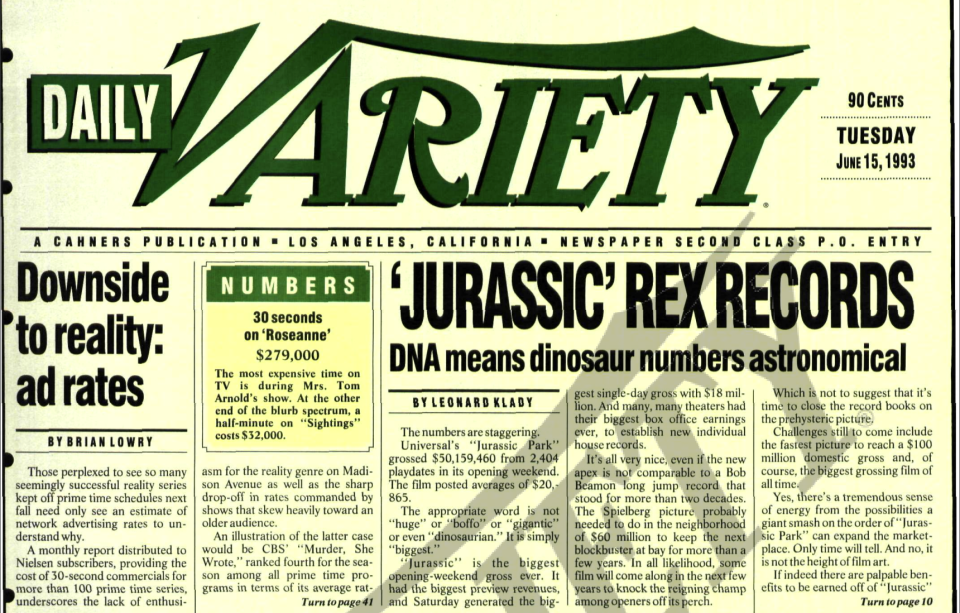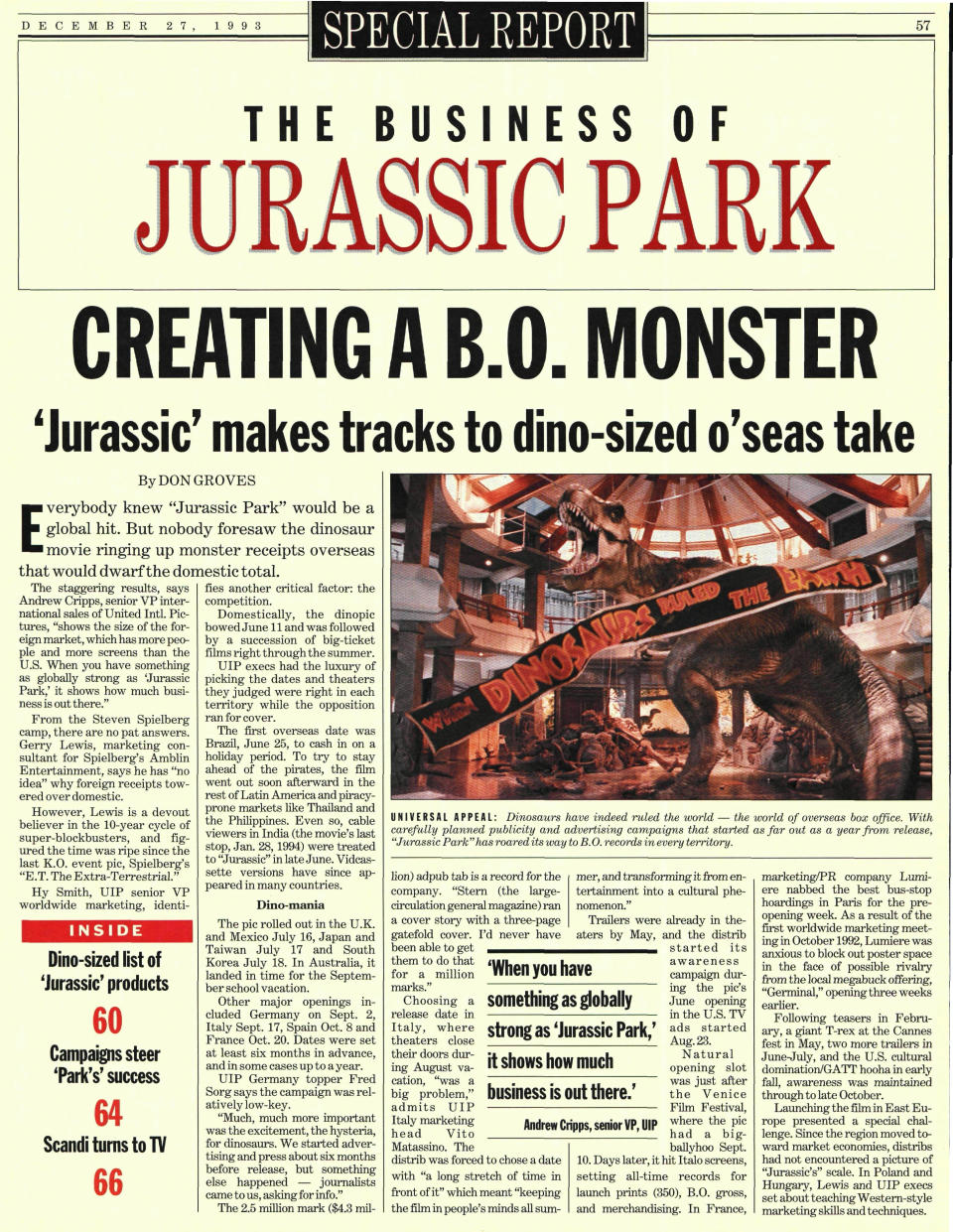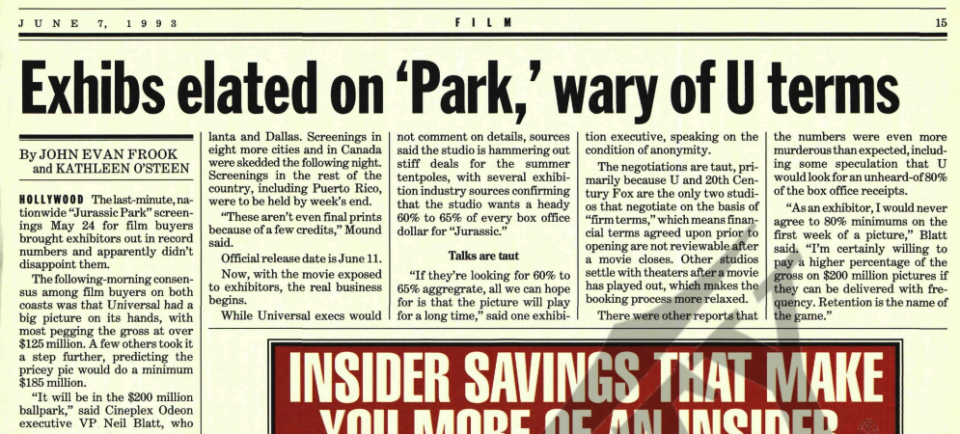29 Years Ago, Steven Spielberg’s ‘Jurassic Park’ Reinvented the Blockbuster and Stomped Its Way to Box Office Domination
- Oops!Something went wrong.Please try again later.

In 1993, audiences were charmed by Robin Williams in “Mrs. Doubtfire,” emotionally stirred by horror and heroism in “Schindler’s List” and reassured that true love exists after checking out “Sleepless in Seattle.”
But there’s no denying that the movie of the year, at least in terms of sheer box office impact, was “Jurassic Park,” Steven Spielberg’s epic story of dinosaurs gone rogue.
More from Variety
'Jurassic World: Dominion' Sinks Teeth Into $16.7 Million at International Box Office
Sam Neill: Moviegoers No Longer Accept Spielberg's Slow-Burn 'Jurassic Park' Action Pacing
Laura Dern Says 20-Year Age Gap With Sam Neill Felt 'Completely Appropriate' 30 Years Ago
Thanks to stunning CGI advancements and quality storytelling to match, “Jurassic Park” became a sensation that changed cinema by revealing the potential of digital imagery. If Spielberg could bring a Tyrannosaurus rex back from extinction… what else was possible?
It also became the highest grossing movie ever made, at least until “Titanic” sailed past it four years later. In many ways, “Jurassic Park” helped to usher in a new era at the movies by accelerating Hollywood’s dive into fantasy, comic book adventures and an adherence towards spectacle above all else. In the early 1990s, the biggest movies were based on best-selling novels (as was the case with “Jurassic Park”) or well-known characters (like James Bond). With “Jurassic,” Spielberg presciently looked forward to a period where special effects would evolve into the ultimate big screen draws. It was not only a high-concept movie in which dinos were on the loose; the wizardry used to bring the otherworldly beasts to life later made it possible for Tony Stark to take flight in “Iron Man” and Dominic Toretto’s car to defy the laws of gravity in “The Fast & The Furious” franchise.
The film’s popularity has only grown in the decades since, inspiring theme park rides, follow-up films and a sequel trilogy that still rules over the box office today. “Jurassic World Dominion,” which opens in the U.S. on June 10, wraps up a saga that’s nearly 30 years in the making, bringing back original stars Laura Dern, Sam Neill and Jeff Goldblum and (relative) franchise newbies Chris Pratt and Bryce Dallas Howard. It’s a legacy that few properties in Hollywood can claim.
When the original “Jurassic Park” opened in cinemas on June 11, 1993, the film took the country by storm. Ticket sales reached a record-setting $50 million in a single weekend, overtaking the benchmark set by “Batman Returns,” which debuted to $45 million in 1992. With today’s inflation rates, “Jurassic” would have neared triple digits in its debut, but remember, these were the days before Marvel movies and other big-budget tentpoles turned $100 million opening weekends into routine practice. Everybody, even those who didn’t regularly go to the movies, was talking about “Jurassic Park,” a deep dive into Variety‘s archives from the time reveals.
“The appropriate word is not ‘huge’ or ‘boffo’ or ‘gigantic’ or even ‘dinosaurian.’ It is simply ‘biggest,'” Leonard Klady wrote in the June 15, 1993 edition of Daily Variety.

With a hype that left even the most breathless box office sage cycling through synonyms for massive, film buyers predicted “Jurassic Park” would gross at least $125 million and as much as $185 million in its domestic run. As the days went on, those estimates kept creeping higher and higher. On June 18, Variety wrote “Jurassic Park” was poised to hit the $100 million benchmark at record speed. Ultimately, the article says, “Steven Spielberg’s dinosaur adventure will have reached that milestone in nine days, one day quicker than former record-holder, 1989’s ‘Batman,’ and two days ahead of last year’s ‘Batman Returns.'”
Then, box office watchers were hoping the movie would cross $200 million in one month — a pace that no film had ever matched. By June 22, 1993 — less than two weeks later — it became clear to industry observers that “Jurassic Park” would eclipse those heights much sooner than expected. “Now, it looks possible for the film to reach that level in as little as 23 days,” the Daily Variety article predicted. (Indeed, “Jurassic” hit the $200 million milestone in 23 days.) After 67 days, roughly two months later, ticket sales cleared $300 million and after a whopping 497 days, the movie finally ran out of steam with an eye-popping final tally of $357 million. In a weird milestone that indicates its unusual staying power on the big screen, “Jurassic Park” still holds the record for the slowest movie to surpass $350 million in domestic box office receipts.
But as popular as “Jurassic Park” became in the U.S., the movie really exploded at the international box office. Overseas, the film grossed a monster $621 million. That success was critically important, because it revealed how much profit could be mined from international markets at a time where Hollywood still was much more focused on the domestic marketplace.
“Everybody knew ‘Jurassic Park’ would be a global hit,” according to a special report on the business of “Jurassic Park” that ran in Variety on Dec. 27, 1993. “Nobody foresaw the dinosaur movie ringing up monster receipts overseas that would dwarf the domestic total.”

Variety
In the same article, Spielberg’s camp said it had “‘no idea’ why foreign receipts towered over domestic.” Some industry experts quoted in the piece were quick to point to the prime release date, which was devoid of major competition, and others suggested the word-of-mouth from the U.S. got people excited in other parts of the world.
“You have to put those numbers in perspective,” Andrew Cripps, who spearheaded the rollout of “Jurassic Park” as senior VP international sales of United Intl. Pictures, says today. “None of those international markets were anywhere near where they were today. It shows, for the time, how incredibly successful it was internationally.”
Even before Michael Crichton published his novel “Jurassic Park,” the sci-fi project became a hot property and sparked a bidding war, with Universal emerging victorious over Warner Bros., 20th Century Fox and Columbia Tri-Star. According to the May 25, 1990 edition of Daily Variety, Universal agreed to pay $2 million for the screen version of Crichton’s book and prepared to spend $40 million to $50 million to produce the film. The final price tag was roughly $60 million, not including the multi-million marketing budget. Spielberg was the early favorite to step behind the camera (he was “the most insistent,” Variety reported at the time, and Crichton felt Spielberg would be “most faithful to the work”), though Tim Burton was also in contention to direct.
“It was one of those movies we started working on more than a year in advance,” Cripps recalls today of distribution efforts. “We got our entire global organization behind it. When we saw the dailies, it was stuff we’d never seen before.
At a pivotal time in Spielberg’s career (his two movies prior, 1991’s fantasy adventure “Hook” and 1989’s romance drama “Always,” were box office disappointments), “Jurassic” served as a reminder to Hollywood that he had his finger firmly on the pulse of the zeitgeist. It was also the kind of filmmaking he would soon move beyond. In the same year, Spielberg made his most personal film, the Holocaust drama “Schindler’s List,” which won several Oscars and paved the way for his next chapter — telling timely and timeless stories about history and politics.
For the most part, the studio had attempted to conceal the major plot points in “Jurassic Park” in the hopes that audiences would be delightfully surprised by the horror and heart in the completed film. But in the days leading up to its theatrical release, Universal hosted a last-minute screening to wow the nation’s cinema operators. It worked, prompting the June 7, 1993 Daily Variety headline “Exhibs elated on ‘Park’/ wary of U terms.”

Here’s the story behind the second half of that headline. By presenting the film early, Universal believed cinema owners would submit to the hype and would not be able to resist playing the movie in their venues. After charming exhibitors, the studio attempted to negotiate a deal that would grant the studio “unheard of 80%” of box office receipts, according to a Daily Variety report from June 7, 1993. (Today, it’s still commonplace for studios and exhibitors to split the profits roughly 50-50.) The eventual terms aren’t clear, but Cripps remembers “The movie was sold at the highest terms the market could support.” In other words, Universal knew it had a hit on its hands and wanted to profit handsomely.
Theater owners were not left hanging out to dry. In the front page story on June 15, 1993, Variety reported that “many, many theaters had their biggest box office earnings ever, to establish new individual house records.”
One theater owner from 1993 explained the phenomenon by saying, “Steven Spielberg has done an incredible job of recreating dinosaurs, which previously only existed in our imaginations.”
Best of Variety
Sign up for Variety’s Newsletter. For the latest news, follow us on Facebook, Twitter, and Instagram.

